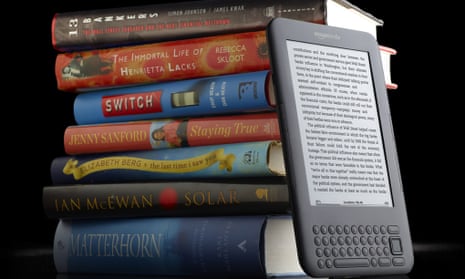My anti-Amazon stance once made my sister cry. It was Christmas morning. She was talking enthusiastically about her Kindle and the freedom it gave her to read books and newspapers from around the world. I pounced, scolding her for supporting the Voldemort of the book industry.
Didn’t she know Amazon was destroying our independent bookstores through its loss-leading low prices? Or that by locking Kindle users into buying from Amazon, and preventing them from easily reading their purchases on, say, the Kobo or Sony Reader, it had created a “walled garden” that was giving it a frightening ebook market share (an estimated 60% in the US and 80% in Australia)?
I suggested she sell the Kindle on eBay. It was about then that the tears began. I’d tarnished the curiously intimate relationship she had developed with her shiny reading machine – particularly upsetting because she is, in fact, a thoughtful consumer, always mindful of ethical issues.
I was equally passionate in my criticism of Amazon when I read about the well-intentioned Indigenous Reading Project, a not-for-profit (well, not for its own profit) programme to raise funds to buy Kindles for children around Australia in order to boost literacy levels. To me, it was the equivalent of allowing McDonald’s to open pop-up stores next to schools, then closing tuckshops.
I’ve written about Amazon’s dismissive treatment of the Australian market (it releases e-reading devices months and even years later here than in the US, and regularly blocks Australian readers from downloading original and experimental Amazon Publishing content).
So how is it, then, that my top two dream dinner party guests are the Amazon chief executive, Jeff Bezos, and the Kindle Singles editor, David Blum? Or that when I heard the news about Bezos buying the Washington Post, my first thought was not “Noooooooo!” but, “I wonder if we can entice him to buy Fairfax?”
You see, gradually, and very much in denial about it all the while, I have turned into my worst nightmare: an independent bookstore-loving bibliophile who shops mostly at Amazon. Whatever you do, please don’t tell my sister.
A couple of things led me on this utterly hypocritical journey to the dark side. It wasn’t price, although I will admit that from time to time I bought from the Kindle store because the books were cheaper. It wasn’t social reading capabilities (digital book chatter in the margins of ebooks and on websites and social media platforms) either, because Kobo’s Reading Life interface is better – although Amazon’s acquisition of the social platform Goodreads, which had 20 million members at last count, could change that.
No, the clinchers were these:
1. The ability to close an ebook on one device, then open it on another – your iPhone, for example – and start exactly where you left off (Amazon calls this Whispersync).
2. The “My highlights” page. As a book reviewer and researcher, being able to view every passage I’ve highlighted or made a note about while reading on the Kindle app is magical.
3. Exclusive content such as Kindle Singles. These quick, cross-genre reads are longer than a magazine feature but shorter than a printed book – Amazon has sold 5m of them since their 2011 launch.
So, against my own better judgement, I've been dazzled into submission by Amazon’s industry-leading innovation. And more surprising than my personal turnaround has been my rapid switch as a book publisher, from considering selling my titles exclusively through independent booksellers, or at the very least trying to promote those channels as a preference, to actually considering taking up Amazon’s offer of higher royalties for exclusive sales rights for the first six months.
As a publisher, Amazon is a joy to work with. It sells a lot of books. It pays high royalties. And it makes ebook distribution incredibly simple. Like about 764,321 times easier than all of its competitors, aside from Kobo, which has also recognised the value of supporting small publishers and self-publishing authors.
I only wish Amazon could come up with a way of supporting our indie booksellers rather than threatening their livelihoods too. Mr Bezos? Are you reading this? If anyone can come up with an idea to solve this one, it’s you.
